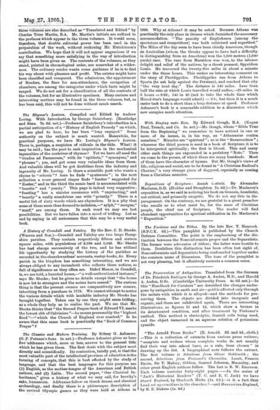The Itivynter's Lexicon. Compiled and Edited by Andrew Loring. With
Introduction by George Saintsbury. (Routledge and eons- 713.-6d. net.)—Professor Saintsbury's introduction is a partial anticipation of a "History of English Prosody" on which, we are glad to hear, he has been "long engaged." Some authority on the subject is much wanted. Meanwhile, for practical purposes, we have Mr. Loring's Rhymer's Lexicon. There is, perhaps, a suspicion of ridicule in the title. What! it may be said ; has the poet to seek inspiration in the mechanical ingenuities of the contrivefof rhymes? Yet we have all used the " Gradus ad Parnassum," with its "epithets," "synonyms," and " phrases " ; yes, and got some very valuable ideas from them. And valuable ideas will be got doubtless from the industry and ingenuity of Mr. Loring. Is there a scientific poet who wants a rhyme to " schesis " ? here he finds " synteresis "; in the next collection a more general singer finds " feaster " suggested for "Easter," and in the third the comic bard is accommodated with " beastie " and "yeasty." This page is indeed very suggestive : " feasting " has a sinister assonance with " nnpriesting," and " beastly " a really scandalous one with "priestly." There is a useful list of sixty words which are rhymeless. It is a pity that some of them seem thus doomed to isolation,—" sylph," "morgue," "Scarf," are among them. In each word we may see lost possibilities. But we have fallen into a mood of trifling. Let us end by giving in all seriousness that this may be a very useful book.






































 Previous page
Previous page